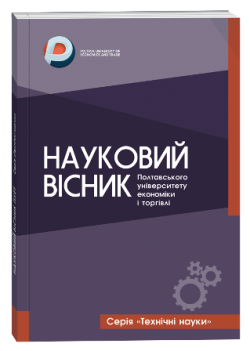ZERO WASTE AS AN INNOVATIVE CONCEPT OF PRODUCTION ORGANIZATION IN THE RESTAURANT BUSINESS
Abstract
The importance of reducing food waste lies in its impact on the environment, as it prevents food from ending up in landfills, reduces methane emissions and reduces carbon footprints. Food waste is a global problem, both from an economic and environmental point of view. The purpose of the study is the analysis of technological and production processes in restaurants in order to develop recommendations for reducing food waste. The research methodology is also based on the synthesis and analysis of information material, the study of scientific and practical developments of domestic and foreign specialists in the field of restaurant business. The production process in a restaurant can be conditionally divided into several stages: drawing up a menu; ordering raw materials and products; storage of raw materials; mechanical culinary processing of raw materials; preparation of products; decoration of dishes before serving. To solve the problem of food waste, it is necessary to completely revise the approaches to the processes of production organization. Solving the problem of low-waste production begins with work on the establishment's menu. This direction includes several aspects: the concept of the institution, the formation of a rational product line with the aim of the most complete use of raw materials; portion size and control. The choice of suppliers is also an important factor in the zero waste concept chain. Locomotion is becoming a popular trend in the world. Innovations related to the technology of preparing culinary products help in the implementation of low-waste production; introduction of modern technological equipment. To solve the problem of food waste, it is necessary to completely revise the approach to the production of culinary products in restaurants. We have identified the main structural elements of the production process that can minimize the amount of waste.
References
2. Kaur, G., Lasaridi, K., & Wong, J. (2021) Sustainable Food Waste Management, Current Developments in Biotechnology and Bioengineering, Elsevier. Рр 1-10.
3. Zero-waste Europe. Retrieved from: https://zerowasteeurope.eu/about/about-zerowaste. (accessed 20 September 2024).
4. 17 tsiley staloho rozvytku. URL: https://globalcompact.org.ua/tsili-stijkogo-rozvytku. [17 sustainable development goals] (accessed 24 September 2024) [in Ukrainian].
5. Emil Juvan, Bettina Grün, Sara Dolnicar. (2023) Waste production patterns in hotels and restaurants: An intrasectoral segmentation approach, Annals of Tourism Research Empirical Insights, Volume 4, Issue 1.
6. Filimonau, V., de Couteau, D. (2019) Food waste management in hospitality operations: A critical review Tourism Management. Рр 234–245.
7. Holovatyuk, A.YU., & Ryashko, H.M. (2022). Osoblyvosti vprovadzhennya kontseptsiyi zero waste v zakladakh restorannoho hospodarstva [Peculiarities of implementing the concept of zero waste in restaurants], zb. tez dop. ХІ Vseukr. mizhvuz. nauk. konf. «Intehratsiyni ta innovatsiyni napryamky rozvytku industriyi hostynnosti» - coll. theses add. XI All-Ukrainian interuniversity of science conference: «Integrative and innovative directions of development of the hospitality industry». (рр. 178-179). Odesa [in Ukrainian].
8. Кolesnik, YU. (2022). Pryntsyp bezvidkhodnoho vyrobnytstva v zakladakh hotelʹno-restorannoho hospodarstva [The principle of waste-free production in hotels and restaurants], zb. tez dop. III Mizhnar. nauk.-prakt. konf.: «Suchasni tendentsiyi industriyi hostynnosti» - coll. theses add. III International science and practice conference: «Modern trends of the hospitality industry». (pp 47-49). Lʹviv : LDUFK im. Ivana Bobersʹkoho [in Ukrainian].
9. Dochynets, I.V., Kyrpichenkova, O.M. (2023).Kontseptsiya Zero-waste v sferi hotelʹnoho ta restorannoho biznesu [Concept of Zero-waste in the field of hotel and restaurant business] Mat. мizhn.-prakt. internet-konf.: «Innovatsiyni tekhnolohiyi ta realizatsiya kontseptsiyi Zero-waste u kharchovykh tekhnolohiyakh i sferi restorannoho, hotelʹnoho ta turystychnoho biznesu» - мaterials of the іnternational science-practice internet conf.: «Innovative technologies and implementation of the Zero-waste concept in food technology and the field of restaurant, hotel and tourism business». (pp 228-231). Poltava: PUET. [in Ukrainian].
10. Rohova, A.L., Shydakova-Kamenyuka, O.H. (2023) Ekonomiko-ekolohichni aspekty pererobky vtorynnykh resursiv kharchovoyi promyslovosti [Economic and ecological aspects of processing secondary resources of the food industry], мat. мizhn. nauk.-prakt. internet-konf.: «Innovatsiyni tekhnolohiyi ta realizatsiya kontseptsiyi Zero-waste u kharchovykh tekhnolohiyakh i sferi restorannoho, hotelʹnoho ta turystychnoho biznesu». - мaterials of the іnternational science-practice internet conf.: «Innovative technologies and implementation of the Zero-waste concept in food technology and the field of restaurant, hotel and tourism business». (pp 179-181). Poltava: PUET. [in Ukrainian].
11. Khomych, H.P., Horobets, O.M., Sokol, A.A., & Ivanov, V.YU. (2019). Vykorystannya kavovoho shlamu v tekhnolohiyi boroshnyanykh vyrobiv [The use of coffee grounds in the technology of flour products], мizhnar. nauk.- prakt. konf., prysvyachena 45-richchyu vid dnya zasnuvannya fakulʹtetu KHTHRTB «Aktualʹni problemy ta perspektyvy rozvytku kharchovykh vyrobnytstv, hotelʹno-restorannoho ta turystychnoho biznesu» - International science and practice conf., dedicated to the 45th anniversary of the founding of the faculty of HTGRTB «Actual problems and prospects for the development of food production, hotel-restaurant and tourist business». (pp 41-43). Poltava : PUET [in Ukrainian].
12. Tkachenko, YE.YU., & Petrusha, O.O. (2019). Vykorystannya kharchovykh vidkhodiv yak vtorynnoyi syrovyny [Use of food waste as secondary raw materials], mater. tez dopovidey ІХ Mizhn. nauk.-prakt. konf.: «Kompleksne zabezpechennya yakosti tekhnolohichnykh protsesiv ta system» - material. theses of reports of the ІХ Inter. science and practice conference: «Comprehensive quality assurance of technological processes and systems». (pp 54-55). Chernihiv: CHNTU [in Ukrainian].
13. Sedikova, I.O., Asaulenko, N.V., & Sedikov, D.V. (2021). Kharchovi vidkhody v industriyi hostynnosti: problemy i shlyakhy vyrishennya [Food waste in the hospitality industry: problems and solutions]. Ekonomika kharchovoyi promyslovosti. Tom 13, Vypusk 4 - Economics of the food industry, Volume 13, Issue 4. (pp 75–80) [in Ukrainian].
14. Pontes, Thais & César, Aldara & Conejero, Marco Antonio & Rodrigues Deliberador, Lucas & Batalha, Mario. (2022). Food waste measurement in a chain of industrial restaurants in Brazil. Journal of Cleaner Production. 369.
15. Samilyk, M. (2022). Vplyv lokavorstva na rozvytok hastronomichnoho turyzmu Sumshchyny [The influence of locavore on the development of gastronomic tourism in Sumy Oblast]. Visnyk Kyyivsʹkoho natsionalʹnoho universytetu kulʹtury i mystetstv. Seriya: Turyzm, 5(1) - Bulletin of the Kyiv National University of Culture and Arts, 5(1). (pp 48-56). [in Ukrainian].
16. Chien-Chang Chiang, Ling-en Wang, Belal J. Muhialdin (2023), Resourcefulness of chefs and food waste prevention in fine dining restaurants, International Journal of Hospitality Management, Volume 108.
17. Peresichna, S.M., & Bodenchuk, A.K. (2022). Suchasni tekhnolohiyi vyhotovlennya kulinarnoyi produktsiyi [Modern technologies for the production of culinary products], мat. ІХ мizhn. nauk.-prakt. konf.: «Hostynnistʹ, servis, turyzm: dosvid, problemy, innovatsiyi» - мat. IX International science and practice conf.: «Hospitality, service, tourism: experience, problems, innovations». (pp 239-242). Kyyiv: KNUKIM [in Ukrainian].


